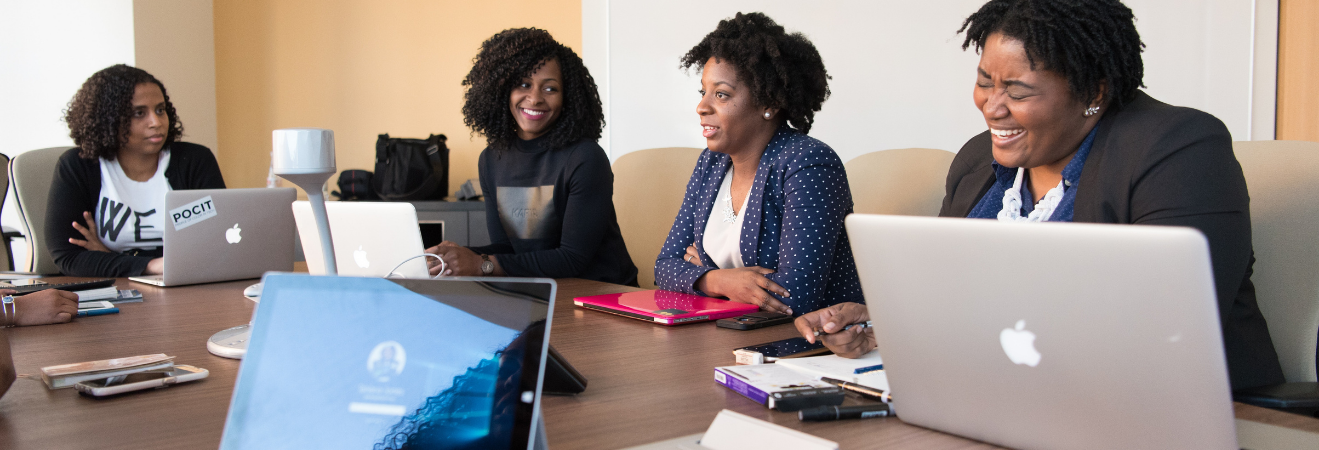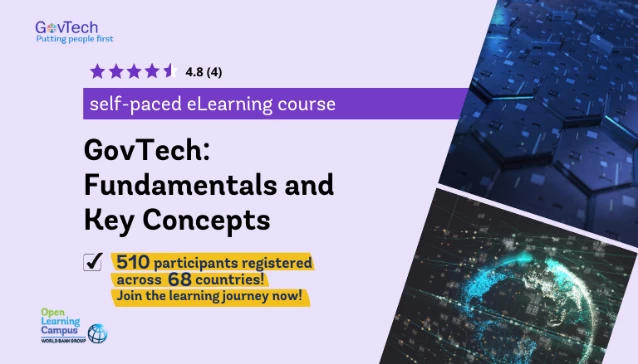 Women in a conference room,
Women in a conference room,
Are you one of the officials who wants government to modernize in order to help startups enter the digital era and address some of the key development challenges? Or a ministry of finance official who has adopted a new, comprehensive Financial Management Information System (FMIS) but is concerned about whether all spending units are using it? Or a policy maker who designed the perfect app for citizens to view the local budget and are wondering why no one is using it? Or a World Bank task team member who is working on helping countries adopt new digital technologies to increase transparency and efficiency in the public sector? If you are, this course is meant for you. It offers useful insights on citizen-centric design; explains how to apply digital solutions in order to minimize fraud and corruption; and demonstrates how to use GovTech to boost the private sector’s performance in the digital economy.
GovTech or using technology to modernize public sector administration is a relatively new concept. It was initially defined as an ecosystem in 2015, where startups and small and medium enterprises come up with innovative solutions and services to address challenges in the public sector. The term was then picked up by policymakers, investors and innovators who saw it as an initiative that could potentially help generate economic growth, improve public services, increase efficiency, support transparency, and reduce costs. The World Bank, client countries and development partners have used the term “digital government” to describe the modernization and transformation in public sector, and some still do, and GovTech builds on that foundation. We share a few examples below to demonstrate how different countries are using it.
- In Denmark, the GovTech program supports the creation and funding of startups.
- GovTech Singapore harnesses digital technology to support businesses and government and provide services to citizens.
- GovTech Early Metrics in Estonia produces ratings and research to evaluate startups and SMEs. Their aim is to provide the right open innovation tools for decision-makers to engage with the best innovative startups.
- In Germany, GovTech Gruppe has been supporting the digitization of the state and its administration in e-government-driven changes since early 2018.
- Some organizations like The GovLab Academy offers graduate and professional-level courses, focusing on the overall governance innovation process and application of technology to solve problems in the public sector.
GovTech at the World Bank
The World Bank defines GovTech as a whole-of-government approach to public sector modernization that promotes simple, efficient, and transparent government, with citizens at the center of reforms. The GovTech Initiative was launched in 2019 to support public sector reforms. As a part of this initiative, the GovTech Academy was launched in 2021 to equip government officials, World Bank Group staff, practitioners, and development partners with the knowledge base to understand GovTech concepts, solutions and good practices and proactively apply those in digital transformation of the public sector.
The first self-paced online course “GovTech: Fundamentals and Key Concepts,” offered through Open Learning Campus of the World Bank, brought together more than 500 participants from 68 countries since its launch on November 1, 2021.
The second course, Trends in GovTech solutions for Public Financial Management, which was developed by multiple World Bank teams, will focus on innovative digital solutions. It is developed in partnership with the State Secretariat for Economic Affairs (SECO) of Switzerland, the Lucerne University of Applied Sciences and Arts/Hochschule Luzern (HSLU) and the German Agency for International Cooperation (GIZ). The Korean KDI School of Public Policy and Management also contributed to the funding for the development of course contents.
The GovTech OLC courses cover the key concepts, trends, challenges, and opportunities in four focus areas: supporting core government systems, enhancing service delivery, mainstreaming citizen engagement, and fostering the GovTech enablers for public sector modernization. Additionally, they provide a variety of relevant country cases highlighting the good practices in various sector reforms.
The World Bank provides financial and technical assistance to developing countries to implement low cost and rapidly deployable digital solutions that support key public-sector reforms and programs , thus making their contribution to reaching Sustainable Development Goals. The GovTech Academy contributes to digital technology solutions that can address the institutional and operational challenges that institutions face in the public sector.



Join the Conversation